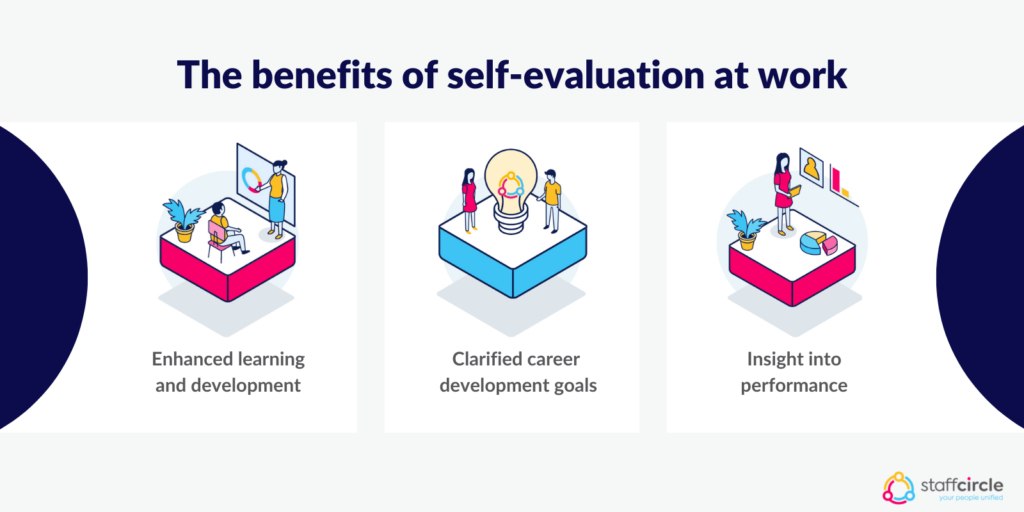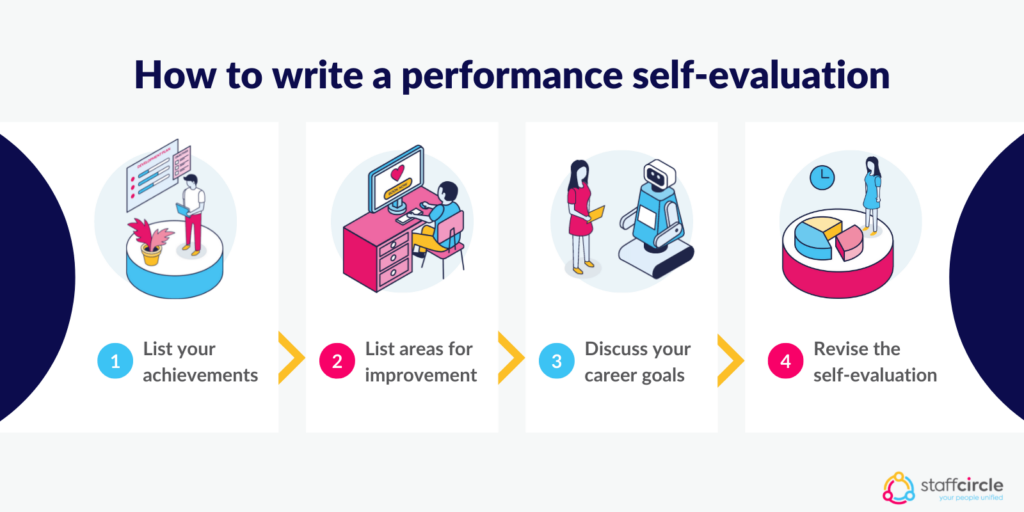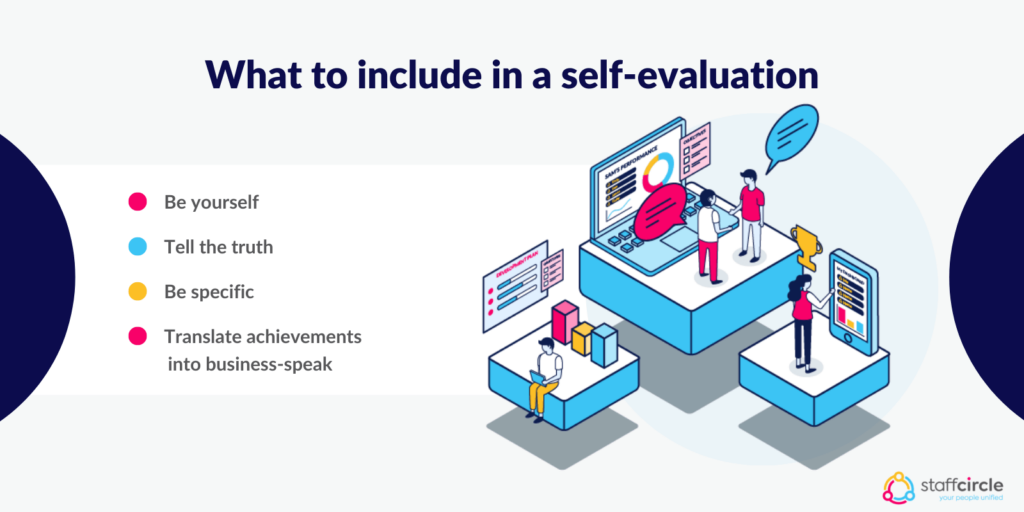What is self evaluation?
A self evaluation is an important aspect of performance reviews. It allows employees to reflect on their strengths and weaknesses, celebrate their achievements, ensure they’re meeting the responsibilities mentioned in their job description, and provide a road map for their professional development and future job performance.
The importance of self assessments has been understood for decades, tracing its roots back to the 1950s. Their necessity was discussed in a 1972 article from the Harvard Business Review, An Uneasy Look At Performance Appraisal, which stated:
“A sounder approach, which places the major responsibility on the subordinate for establishing performance goals and appraising progress toward them, avoids the major weaknesses of the old plan and benefits the organization by stimulating the development of the subordinate.”
In this guide to writing a strong self assessment, we’ll explore the key benefits they bring, how to write your own self evaluation, and other useful tips you should know before you get started.
What are the benefits of self evaluation at work?
Self assessments bring a range of benefits to both employees and the company at large. Let’s take a look at some of the key benefits you can expect.
Enhanced development and learning
Self evaluations offer an opportunity for employees to frame their strengths and weaknesses in terms of development and learning. A study from the NIH analysing the impact of self assessment by students on their learning concluded:
“From this study, we can conclude that self-assessment can increase the interest and motivation level of students for the subject leading to better academic performance and enhanced learning. It can also help in development of critical skills among students to assess and analyze their own work, an essential component of self-directed lifelong learning.”
This is equally applicable to strong self assessments conducted in the workplace in preparation for the next performance review.

Clarifying career development goals
When written correctly, self evaluations are the key to career development, giving employees a chance to determine their goals for the future and the support they need to get there. They can provide a valuable starting point for the establishment of a comprehensive Personal Development Plan (PDP) that can be used to help them achieve professional development goals in a timely manner.
Delivering insights into performance and future work objectives
Perhaps the most important aspect of the self evaluation process is its impact on future work objectives. Employees who write a strong self evaluation can more effectively communicate with managers about their role and responsibilities, setting objectives and key results (OKRs) that are aligned to their abilities.
How to write a performance self evaluation
There are a variety of ways HR departments and managers structure a self evaluation template. Some use open ended questions, whereas others use surveys with a ratings scale the employee fills in. When driving employee success through automated appraisals, make sure you keep the template consistent for all employees to allow for company-wide data analysis.

If you’re an employee carrying out a self evaluation, follow these steps:
1. List your achievements
What have you accomplished since your previous performance review? How have you had a positive impact on your team, department, and the company at large? Brainstorm your past achievements and select those that best reflect how you have developed. You can use performance management software to review your key performance indicator objectives to help fill this section in more accurately.
Achievements and accomplishments can include:
- I improved efficiency in the workplace by introducing a new system that streamlined the ordering process
- I assisted a colleague in the capacity of a mentor, helping them to pass an important test [insert details]
- I sponsored a project that increased the customer conversion rate by creating a more efficient pipeline
- I collaborated with colleagues to find an innovative solution to a problem [insert details]
- I have shown excellent communication skills [Insert details]
2. List your areas for improvement
While a strong self evaluation should always play up to the employee’s strengths, don’t forget to include any areas for improvement you’ve identified when reviewing your past performance. You can frame these in terms of your professional development and career goals so any negative connotations are transformed into a positive.
3. Discuss your career goals
We’ve touched upon this in the previous section, but it bears repeating that a self evaluation that fails to include career goals is a wasted opportunity. If your manager or team leader doesn’t have a clear idea of the direction your professional development is heading, they won’t be able to provide the training and resources you need to get there.
Career goals could include:
- I would like to improve my communication skills by delivering X amount of presentations in the next quarter
- I would like to improve my time management skills and deliver projects before their deadlines [give details of how you intend to accomplish this]
- I would like to increase my emotional intelligence by writing and maintaining a mindfulness journal
- I want to further develop my programming skills by learning a new language [cite the course/qualifications relating to this]
4. Revise the self evaluation
Once you’ve finished your self evaluation make sure you revise it thoroughly in case there’s anything you’ve missed that needs to be included. Check it for any spelling and grammatical errors, as a sloppily-written self evaluation will lack professionalism, even if the content within it is excellent.
It may also be worthwhile sending it to your peers, as these colleagues may be able to provide feedback and remind you of other accomplishments you may have forgotten about.
What should employees include in a self evaluation?
Writing a great self evaluation requires adopting the appropriate mindset about how you frame your accomplishments and experiences at work. Here are the key aspects to consider to make your self assessment ring true with managers and team leaders.
Be yourself
Authenticity is difficult to fake, and if your self evaluation includes embellishments that aren’t true to your nature they’ll be spotted a mile away. Always keep them rooted in who you are, including both strengths and weaknesses. A strong self evaluation is one that represents the best version of who you really are.
Tell the truth
Just as inauthenticity is a surefire way to a poor self evaluation, so too is failing to tell the truth. While it may be tempting to twist the truth to cast yourself in a more favourable light, if your manager carries out a 360-degree feedback process as part of your performance review, any lies or twisting of the truth in your self assessment will be clear.

Translate your achievements into business-speak
The way you word your achievements can easily be misinterpreted as bragging if you’re not careful with the language you use. A professional-sounding self evaluation avoids being boastful and sticks to the facts.
An article from Forbes discussing how to discuss your accomplishments without sounding too self-congratulatory offers the following example:
“Sweeping generalizations and positive labels equate to tooting your own horn. Stick to self-disclosure, rather than self-praise and you’ll sound more authentic. Rather than saying, “I’m an excellent leader,” say, “Since I took over the team, sales have doubled.”
Be specific
When talking about your achievements in your self assessment, make sure you keep these specific. Rather than, for example, state “I’ve improved my leadership skills”, give a clear example of how you have done this in a practical sense.
You can link these to your personal work objectives and personal development goals to show how you’ve improved your skill set and achieved objectives over the period of time since your previous performance review.
Our tips for writing the best self evaluations
Here are some tips that will help you to supercharge your self evaluation and make it as good as it can possibly be.
Give yourself enough time
A common mistake made when filling out a self evaluation is leaving it until the last minute. It should go without saying that if you rush the process, the chances of forgetting to include relevant accomplishments and other important details are higher.
Give yourself plenty of time when writing a self evaluation, especially if you’re planning on gathering feedback from your colleagues and peers.
Keep a record of accomplishments as part of an ongoing process
Any accomplishments you mention in your self evaluation report should, whenever possible, be backed up with evidence. You can use records of your achievements logged in performance management software to offer clear citations with dates and details of work accomplished.
If you have any awards or recognition points in your favour, these can also be found in your performance management records. If peers or your direct reports have praised you for your work, be sure to include this in your self evaluation.





